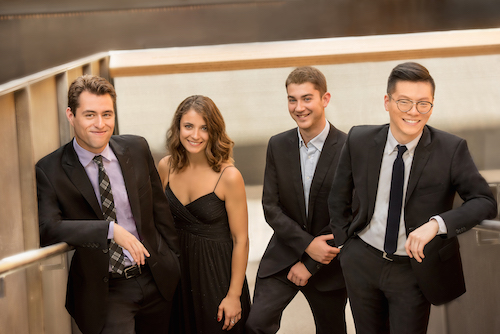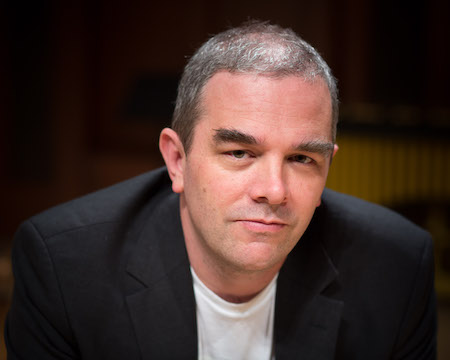by Jarrett Hoffman

The group premiered Bruce’s The Lick Quartet in October on the Dallas Chamber Music Society, then played it again at the Concertgebouw in Amsterdam and the Stadthaus in Ulm, Germany. That makes this the fourth performance of the piece, and if you want to get geographic about it, the East-of-the-Mississippi U.S. premiere.
And about that title — it has nothing to do with anyone’s tongue, but rather it’s the word for a melodic fragment in jazz. According to Bruce’s notes on the piece, the term “lick” has become a cliché, an Internet meme, and an inside joke among musicians. But after he noticed the resemblance of a lick in his early sketches for the piece, he decided to challenge himself to use it unironically.
The licks don’t serve as main themes, but they’re part of the texture and the background material of the work. That presents the opportunity for a kind of game:
For those so inclined, spotting the various statements and fragments of the melody that fly around throughout the piece may, I hope, add to the pleasure of listening.
The four movements are subtitled after composers who influenced the music. Those include Tigran Hamasyan and Jacob Collier from the jazz world, and Dvořák and Janáček from the classical.
“Sometimes it feels very much like a hybrid of musical styles,” Dover violist Milena Pajaro-van de Stadt said by telephone. “From movement to movement, you get the sense of the style that he’s going for, but you really can’t escape David Bruce’s own voice, which is truly an amalgamation of all this different music in a unique and recognizable way. That’s something we really love about his writing. It feels like you’re playing classical music in a way, but it also feels like you’re playing world or folk music. It’s just such a perfect balance.”
Through their performances thus far, the group has varied the selections that surround the Bruce. Here it falls between Britten’s First Quartet and Brahms’ Third. “In Europe we did Mozart’s Adagio and Fugue and the Brahms, but in Dallas the program was really different. We did Beethoven’s Opus 95 and Shostakovich 9.” (The Dover have an affinity for pairing those two composers, she said.)
“Both programs worked really well with David’s piece in different ways, but I’m really excited to get to finally play it alongside the Britten. They’re two of our favorite English composers back-to-back.”

They developed a great relationship with both mandolinist and composer, setting off a chain reaction of collaborations that included touring with Avital and joining him on the all-Bruce album The North Wind Was a Woman.
“All through that time, whenever people asked us which composers we’ve hoped to commission, he was always on that list,” Pajaro-van de Stadt said. “So we got really excited when we found out that both the Concertgebouw and Dallas Chamber Music wanted to help us commission the quartet from him.”
Digging into the Dover’s own history, I asked the violist about the group’s beginning at the Curtis Institute of Music. She and cellist Camden Shaw had played together before, as had violinists Joel Link and Bryan Lee. Was there a learning curve for the upper and lower halves of the ensemble to get used to each other?
“I don’t remember it ever feeling like two and two — just in the sense that I’d played with Camden a bit longer, and Joel and Bryan had known each other since they were thirteen years old,” the violist said. Things clicked immediately. “It felt really cohesive, like something was just working, and there was a chemistry that really felt good.”
That led the group to have what Pajaro-van de Stadt called “the relationship talk” early on: was this just for school, or was it going to be long-term?
“I think everyone was hesitant to mention that they were on the same page — that we were all really excited about the group and wanted to stay together,” she said. “No one wanted to look more excited than the others, but it was pretty obvious right away.”
By the end of their first year together, the group requested to stay an extra year at Curtis “to have a safe place to focus on the quartet, really become a unit, and try to launch a career.” That meant that she and Shaw were there for five years, and Joel and Bryan for six, “because they entered quite young.”
The next step in their commitment was foregoing individual masters’ programs in favor of the Graduate String Quartet in Residence program at Rice University. “That was big because we really didn’t have a career at that point, and we were just putting all our faith in one another.”
It obviously worked out. The Dover swept the 2013 Banff Competition, and among their more recent accomplishments are a Cleveland Quartet Award and an Avery Fisher Career Grant.
One key to their success might be a shared personality trait. As Shaw told Mike Telin in an interview with this publication in 2016, “We’re all obsessive people, so the idea of focusing on one thing and doing it as well as we can possibly do it is very attractive to us.” I asked Pajaro-van de Stadt for her take on that, and whether it’s still true.
“Basically he said we’re perfectionists, and obsessive about the things we want to accomplish? I don’t think that’s changed,” she said. “The funny thing, to get super specific, is that our priorities in rehearsal will shift. A few years ago, I was completely fixated on composers’ tempo markings — I was kind of like the tempo police in the
Quartet. Camden was fixated on intonation, and Bryan on how we could sound as free as possible musically.”
As time passes, they’ve held onto the same collective priorities, but played Yankee Swap with them. “Now I might be the person who wants everything to be super free, and Camden’s talking about tempo. It’s cool because we still have the balance, but it’s also keeping us fresh.”
Tickets for the Dover Quartet’s performance are available online. Christopher Jenkins will give a pre-concert lecture at 6:30 pm.
Published on ClevelandClassical.com November 26, 2019.
Click here for a printable copy of this article



